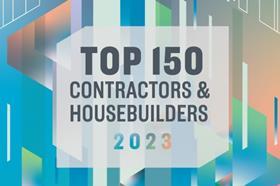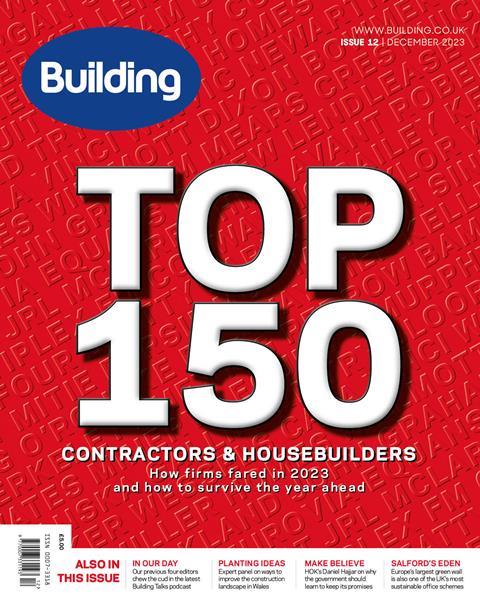Our Top 150 Contractors and Housebuilders data shows firms under pressure and preparing for a difficult year to come

This time last year, with the country still reeling from the shock of Liz Truss’s disastrous 45 days in office, I suggested we might need to strap in for more turbulence in 2023. We have seen nothing like the havoc wreaked by the 2022 mini-Budget, but few in construction can say the past 12 months have been smooth.
The biggest bombshell to hit has been the cancellation of HS2 to Manchester. Rishi Sunak dressed up his U-turn as one of his “long-term strategic decisions” while simultaneously managing to demonstrate the exact opposite by reneging on investment plans that had been years in the making and that would have reaped benefits decades into the future. A confidence boost for investors in UK plc this most definitely was not.
True, the runaway inflation seen in 2022 has abated but you will not see construction bosses toasting Sunak or Jeremy Hunt for a job well done. Any benefit from lower inflation has been cancelled out by having to adjust to the consequences of higher interest rates.
A fair summing up of the market conditions right now would be one of shrinking client demand, higher labour costs, expensive energy bills and supply chain fragility (Tolent, MJ Lonsdale, Claritas and Buckingham are just some that have fallen by the wayside).
Anyone pinning their hopes on juicy spending plans in the autumn statement to revive the market would have been disappointed. Instead Hunt prioritised headline-grabbers such as the national insurance cuts, with a keen eye on next year’s election.
We know from the latest CIPS data that construction output fell yet again in November, the third consecutive month to register a decline. And this week �ڶ����� publishes its own analysis of the health of the sector in our top 150 contractors and housebuilders league tables. This ranking by turnover of the biggest firms gives us a snapshot based on the latest company results available. For the top 150 firms as a group, income increased more than 9%, which sounds less impressive when inflation is factored in and when you take into account the fact that many of the financial results cover the exceptional activity of the covid recovery period.
It is no surprise, then, that the profitability of firms has taken a hit. Our findings show that 40% of the top 150 firms overall – rising to 50% if you only count the top 20 names – reported a year-on-year drop in pre-tax profit. And when it comes to profit margins, 11 out of the top 20 firms reported a decline.

>> Analysis of the contracing and housebuilding market
>> Crunching the top 150 data further
>> Analysis of the largest housebuilders
So, how are firms reacting? With caution, is the blunt answer. Some markets are faring worse than others. The predictions are that the London office market will be flat next year with the prospect it could rebound quickly after that due to pent-up demand. Housebuilding looks particularly bad; the grim mantra among the housebuilders of “survive till ’25” sums up the mood, while one boss told our sister title Housing Today he thinks the doom loop is set in for longer, saying: “survive till ’25, revive in ’27”. The impact is clear from the slew of headlines revealing job losses and senior leadership shake-ups.
Contractors are feeling pain on live jobs that were agreed years ago on fixed-price contacts. And as client demand falls back for future work, there is already evidence contractors are dropping their prices. This can only lead to a downward spiral that weakens the supply chain and benefits no one. John Morgan, the boss of one of the most commercially successful contractors, knows this and told �ڶ����� that he sees subcontractor failure as the biggest risk to Morgan Sindall. Could more main contractors, and importantly more clients, take a similar stance in the interest of protecting the supply chain? Sensible suppliers, for their part, are not holding their breath – aware of risk upstream, they increasingly ask to see main contractors’ balance sheets before committing to jobs.
Fixed-price contracts have never been a sure bet; now they look like a reckless gamble. It will not be easy, but going into 2024 firms will want to avoid being forced by circumstances into making any more bad decisions.
Roll back the years
Let’s switch from dwelling on the present and worrying about the future. A more fun way to round off the year is, I suggest, to press the rewind button and briefly look back at the past.
As part of our 180th anniversary celebrations we have been republishing articles from our extensive archive, and this week we went a step further with a podcast episode in which former editors talk about their time editing one of the world’s oldest trade titles.
The editorships under Peter Bill, Adrian Barrick, Denise Chevin and Sarah Richardson span from the tail-end of Thatcherism, through the economic good times under Blair, then into the austerity era with the Coalition right up to the fallout from Brexit. If nothing else, our lively conversation (read extracts here, and listen online) puts a lot of the current news agenda into some perspective.
Covering construction has always been a bumpy ride – but never a boring one. We laughed a lot recording this podcast, and there were moving moments too. We hope you enjoy this fond tribute to �ڶ����� and the industry it serves.

Chloë McCulloch is the editor of �ڶ�����



























No comments yet